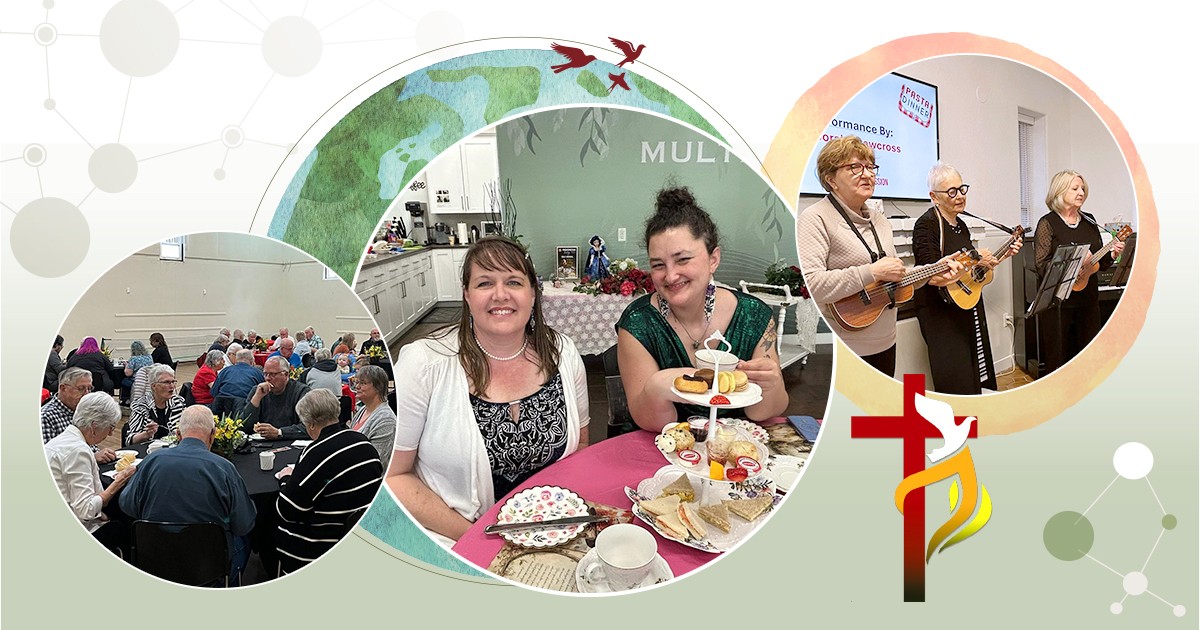 In his seminal book The Spirit of the Disciplines, Dallas Willard notes that spiritual formation isn't new—it's only been lost for a while. He contends it was lost because of the Modernist-Fundamentalist controversy. The liberal church focused on social action and the conservative church became fixated on correct belief—the Gospel was split down the middle. As a result, both sides lost the notion of transformational living.
In his seminal book The Spirit of the Disciplines, Dallas Willard notes that spiritual formation isn't new—it's only been lost for a while. He contends it was lost because of the Modernist-Fundamentalist controversy. The liberal church focused on social action and the conservative church became fixated on correct belief—the Gospel was split down the middle. As a result, both sides lost the notion of transformational living.
As Salvationists we've understood spiritual formation or transformational living to be holiness. We know it to begin with a crisis experience of meeting God accompanied by a lifelong endeavour to move from mercy seat to spiritual maturity. Salvationists have always been open to seeking new insights into the practicalities of living the incarnational life within our own tradition. But are there other traditions we might explore that would deepen and enrich our experience of God and help us move out in service to the world?
Rich Traditions
My own understanding of what it means to be formed, conformed and transformed to the image of Christ has been dramatically stretched and enriched over the past 19 years as I've served internationally and ecumenically. Working in the greater Christian community, I've gleaned insights from other streams of life and faith. My former vision of spirituality was myopic at best, and I am only now beginning to see all that God intends for me as a Salvationist.
Such richness has come through interaction with “higher” church expressions such as the Lutheran and Anglican traditions where I have been challenged to consider all my senses (sight, hearing, taste, smell, touch) in worship. Previously worship for me always happened from the neck up, and then only with certain senses. For several years, I have met with Mennonite and Quaker friends to pray and talk about how God is forming me. The discipline of submitting to their insights is a rich experience.
As I interact with other believers, I see tremendous opportunities for the Church to speak to Salvationists about formation practices, just as we have historically spoken to the Church regarding sacraments and sacramental living.
An Inside Job
What are some historic patterns of holy living that help us raise a family, get along with our neighbours and engage in our culture? How can we heighten our awareness of God and keep our hearts turned toward him as we work and live in our offices, shops and neighbourhoods?
If you have never explored the spiritual disciplines you may be wondering where to start. There are many different ways to group such practices together, but the easiest has been devised by Richard Foster, spiritual formation writer and practising Quaker. The down-to-earth approach in his book, Celebration of Discipline, reminds us that any needed change within our lives is God's work, not ours. “The demand is for an inside job,” he writes, “and only God can work from the inside.”
Foster divides the classical disciplines into three areas: inward disciplines that cultivate our heart and mind; outward disciplines that cultivate our appetites; and corporate disciplines that cultivate our affections to Christ.
Inward Disciplines
Inward disciplines are “foundational” to transformational living. They challenge our inner spiritual lives and are a powerful means of grace as we listen to God's voice and obey his Word. Foster notes that habitual reading of the Bible touches the affections, systematic study of the Bible touches the mind and sustained meditation on the Bible touches the soul. When we read Scripture, we gain a worldview. In reading about God's interaction with people in the Bible, we understand something of God's dealing with us.
As we study Scripture we seek the intent of the author and search for the meaning of the text. Grammar, history, geography and critical research all play a vital part in our inquiry into the written Word. We want to hear what the Bible says rather than make it say what we want to hear. Meditation is the ability to hear God's voice and obey his word by thinking through and personalizing biblical concepts.
Prayer is ongoing dialogue with the Father about what we and God are doing together. Yet prayer must involve other disciplines and spiritual activities if it is to be effective—especially the disciplines of study, meditation and worship, and often solitude and fasting as well.
Of all the inward disciplines, fasting is the least understood or regularly practised in Salvationist circles. Fasting is the voluntary abstention from an otherwise normal function (most often, but not limited to, eating) for the sake of intense spiritual activity. Self-denial in its purest sense is fasting but we have traditionally focused on this only at particular times of the year. The benefit of fasting at regular intervals exposes the way in which our appetites can control us and teaches us to be spiritually perceptive.
Outward Disciplines
Through the outward disciplines we discover the social implications of a transformed life. When we celebrate the principle of simplicity, our lives are free from the need to accumulate (see Matthew 6:33). We are released to joyfully receive and value God's provision for our lives, but not as something to personally hoard. Instead we are freed to share generously with others.
Solitude means regularly choosing to be alone to gain eternal perspective of the things that trap, worry or oppress us. We close ourselves away—go to the ocean, desert, wilderness or the anonymity of the urban crowd. In this sacred space we are still and know that God is God (see Psalm 46:10). We focus on the Lord with such intensity that we stay centred on him even when we return to our regular activities.
When we practise the discipline of silence we close off our souls from sounds, whether noise, music or words. Total silence for most people is rare. What we call “quiet” usually amounts to a little less noise. In the busyness of our tradition, Salvationists find silence shocking because it leaves the impression that nothing is happening. But only in this discipline do we discover the truth of Isaiah 30:15: “In quietness and trust is your strength.” Silence and true listening are often the strongest testimonies of our faith.
Submission is the discipline that enables us to lay down the everlasting burden of needing to get our own way. Here we are open to the guidance of God. It also enables us to accept spiritually mature voices that encourage us in our efforts toward Christlikeness.
In the Army we readily practise the discipline of service, particularly in crisis situations. But the focus of this discipline also challenges us to go beyond our present resources.
Corporate Disciplines
These disciplines are practised through community relationships as we journey together. They are interwoven with inward and outward disciplines.
In community we experience the richness of guidance, God providing direction and purpose to daily life through the voices of others. Confession, allows us to experience the spoken word of forgiveness and let it take root in our lives. The discipline of worship in words, music, ritual and silence reminds us of the importance of meeting together regularly to experience the body of Christ. It's here Salvationists can truly celebrate the joy of our salvation, our life and our world, as a result of confidence in God's greatness and goodness.
Join with me and Salvationists around the globe who are exploring these formative practices in a desire to draw closer to the One who calls us. Of course, these disciplines are not an end in themselves. They should empower us to enjoy a more intimate and transformational relationship with Christ. He is calling us from mere adherence to abundance (see John 10:10).









Leave a Comment